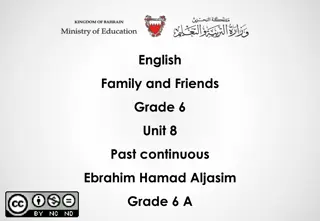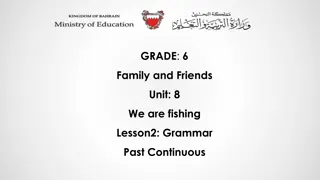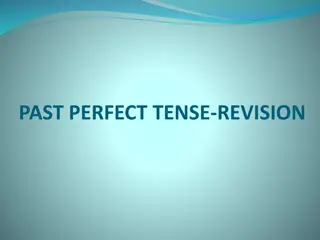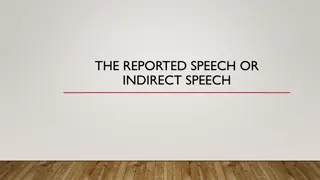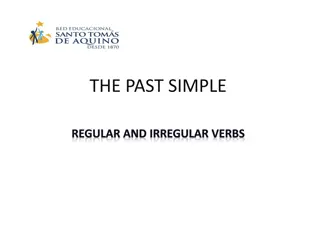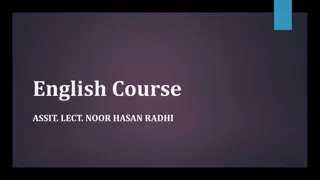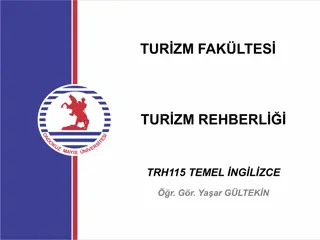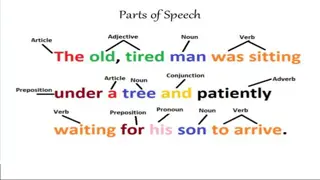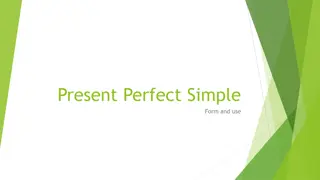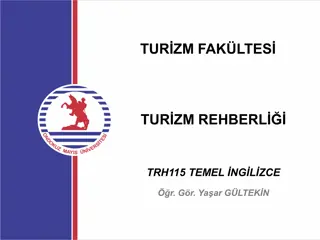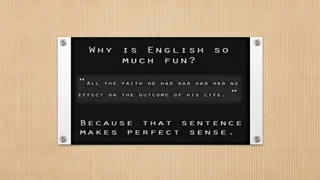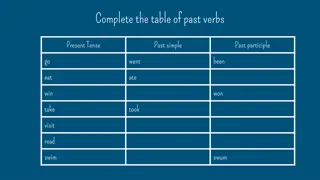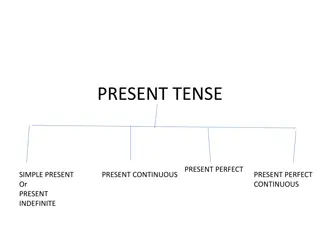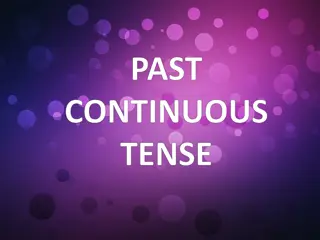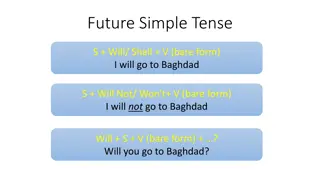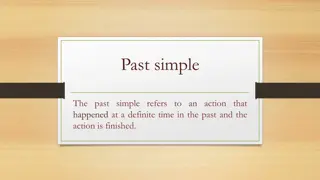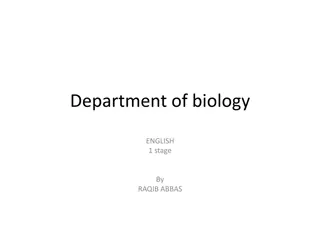Past Simple Tense Essentials
Past Simple Tense is a crucial aspect of English language learning, encompassing affirmative, negative, and interrogative forms. This tense signifies completed actions or events in the past, including common mistakes to avoid and comparison with Present Perfect tense. Explore usage examples and improve your grasp of past simple grammar effortlessly.
Download Presentation

Please find below an Image/Link to download the presentation.
The content on the website is provided AS IS for your information and personal use only. It may not be sold, licensed, or shared on other websites without obtaining consent from the author.If you encounter any issues during the download, it is possible that the publisher has removed the file from their server.
You are allowed to download the files provided on this website for personal or commercial use, subject to the condition that they are used lawfully. All files are the property of their respective owners.
The content on the website is provided AS IS for your information and personal use only. It may not be sold, licensed, or shared on other websites without obtaining consent from the author.
E N D
Presentation Transcript
Intelligent Medical Systems Department Intelligent Medical Systems Department Subject: Subject: English Language English Language Class: Second Class: Second Lecturer: Lecturer: MSC. MSC. Sakina Sakina Hussain Hussain Alsuwaydi Alsuwaydi Lecture: ( Lecture: ( 1 1 ) ) Past simple and Possessive Adjectives Past simple and Possessive Adjectives Study Year: 2024-2025
Past simple Past simple Past Past simple simple The past simple, is a tense in English used to describe completed actions or events that occurred at a specific point in the past.
Affirmative Form Affirmative Form:: For regular verbs, add "-ed" to the base form of the verb (e.g., play played). Subject + regular verb ( Subject + regular verb (ed ed) + object + comp. I played tennis yesterday. ) + object + comp. For most irregular verbs, use the past tense form (e.g., go went, buy bought). Examples: Subject + irregular verb + object + comp. Subject + irregular verb + object + comp. She bought a car last week. She went to the store last night.
Negative Form: Negative Form: Subject + did + not + base verb + object + comp. Use the auxiliary verb "did" + "not" (didn't) + base form of the main verb. Examples: I didn't finish the book. They didn't attend the meeting. P.S. Did is always followed by base verb.
Interrogative Form Interrogative Form:: Use the auxiliary verb "did" + the base form of the main verb + the rest of the sentence. Did + Subject + base verb + comp. + ? Did + Subject + base verb + comp. + ? Examples: Did you visit the museum? Did he complete the assignment?
Usage: Usage: Completed actions in the past: "I watched a movie last night." Past habits: "She always took a walk in the evening." Past facts or generalizations: "The Titanic sank in 1912. : . Yesterday, last year, last month, last week,
Common Mistakes in Past Simple Tense Incorrect: He didn t went to school yesterday. (Correct) Correct: He didn t go to school yesterday. Incorrect: Did she played basketball? Correct: Did she play basketball?
Past Simple vs. Present Perfect Brief comparison: Past Simple: Completed actions at a specific time. I visited the museum yesterday. Present Perfect: Actions with no specific time or still relevant. I have visited the museum. (at the door)
Here are ten irregular verbs in English: 1. Be was/were been 2. Go went gone 3. Eat ate eaten 4. Take took taken 5. Write wrote written 6. See saw seen 7. Break broke broken 8. Do did done 9. Speak spoke spoken 10. Know knew known
Common Irregular Verbs in Detail Begin Began Begun: He began the project last year. Choose Chose Chosen: She chose a red dress for the event. Drive Drove Driven: They drove to the countryside last Sunday.
He played piano yesterday. (Make question) Did + S + Base verb + comp ? Did + S + Base verb + comp ? A/ Did he play piano yesterday? He played piano yesterday. (Use Did not ) S + Did not + base verb+ comp. S + Did not + base verb+ comp. A/ He did not play piano yesterday. He play piano yesterday. (Correct and Use Did not ) He did not play piano yesterday.
Which sentence is correct: He buy a car yesterday. Or He bought a car yesterday. Did he bought a car yesterday? Or Did he buy a car yesterday? She traveled to Turkey yesterday. Or She travels to Turkey yesterdays.
Fill-in-the-Blank Exercise: Complete the sentences with the correct past tense verb: - She ______ (visit) her grandmother last weekend. - They ______ (go) to the park yesterday. A/ 1- visited 2- went Correct the Mistake: Find and fix the errors in these sentences: - He didn't went to school last Monday. A/ Go - Did she played basketball yesterday? A/ Play
A Day at the Beach Last weekend, Sarah and her family went to the beach. They woke up early and packed their bags. Sarah brought her swimsuit, sunscreen, and a book. When they arrived, the sun was shining, and the water looked beautiful. Sarah s little brother built a sandcastle, and her parents sat under an umbrella. Sarah swam in the sea and read her book by the shore. In the afternoon, they ate sandwiches and drank lemonade. At sunset, they packed up and went home. It was a perfect day, and Sarah felt happy and relaxed.
Possessive Adjectives Possessive Adjectives What Are Possessive Adjectives? Definition: Possessive adjectives are words used to show ownership or a relationship to someone or something. Examples: - My - Your This is your pen - His / Her / Its This is her pen or This is hers - Our This is our class - Their That is their class This is my pen P.S. A noun is a word that names a person, place, thing, or idea. Examples: - Person: teacher, doctor - Place: school, park - Thing: book, car - Idea: love, freedom Key Rule: They are always followed by a noun. Example Sentence: This is my book.
Using Possessive Adjectives Purpose: 1. To indicate ownership: This is her pen. 2. To describe relationships: Our teacher is kind. ( Kind is adjective) Examples with Sentences: - My dog is playful. - Your car is fast. -Their house is big.
Advanced Uses of Possessive Adjectives Advanced Uses of Possessive Adjectives 1-Indicating Ownership Clearly: Examples: This is my bag. (specific ownership) That is their car. (group ownership) 2-Describing Relationships: Examples: Her sister is very kind. Our teacher gave us homework. 3-Cultural Context: In English, possessive adjectives are often used to indicate respect or familiarity. Example: 'Their Majesty' or 'His Excellency'.
Formal vs. Informal Uses of Possessive Adjectives Formal Usage: Example: His Excellency addressed the audience. Contexts: Diplomatic, official communication. Informal Usage: Example: This is my pen. Everyday conversations to show ownership.
Complete the sentences with the correct possessive adjective: - This is ______ (we) classroom. - _____(They) house is beautiful. -This is __ (she) favorite book. - __ (you) car is parked outside.
Combining Past Simple with Possessive Adjectives Possessive adjectives and the past simple tense can be combined to describe ownership, relationships, or possessions in past actions or events. 1-Structure Subject + v + Subject + v + ) )Possessive Adjective + Noun Possessive Adjective + Noun( ( + comp. Example: She forgot her keys yesterday. They sold their house last year. + comp. 2. Usage in Context Indicating Ownership in Past Events: - I found my wallet after the meeting. - He borrowed his brother s car last night. - Describing Relationships in the Past: - Our teacher praised us for our homework. - Their parents traveled to Italy in 2019.
3. Important Notes -The possessive adjective must agree with the subject. Examples: I broke my phone yesterday. (my agrees with I). They invited their friends to the party. (their agrees with They). Time expressions clarify when the action occurred. Examples: She visited her grandmother last weekend. We enjoyed our vacation two years ago.
4. Common Mistakes Incorrect: She forgot the her keys. Correct: She forgot her keys. Incorrect: Their mother washed they clothes. Correct: Their mother washed their clothes.


